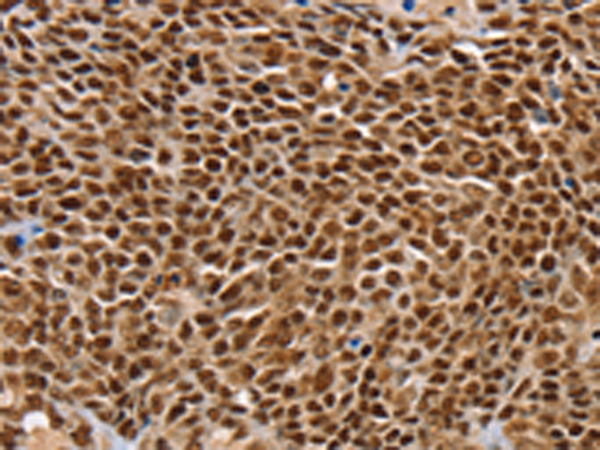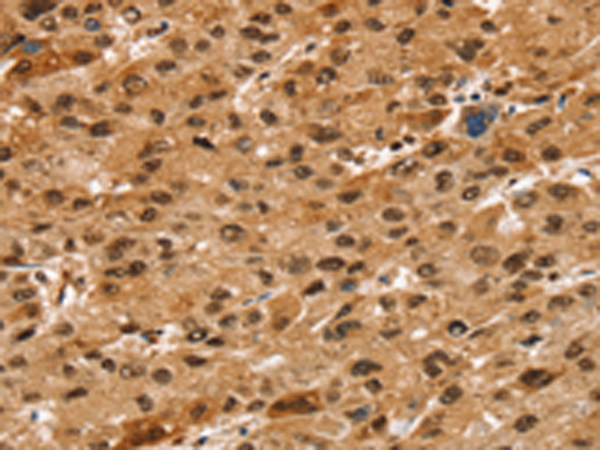

| WB | 咨询技术 | Human,Mouse,Rat |
| IF | 咨询技术 | Human,Mouse,Rat |
| IHC | 1/25-1/100 | Human,Mouse,Rat |
| ICC | 技术咨询 | Human,Mouse,Rat |
| FCM | 咨询技术 | Human,Mouse,Rat |
| Elisa | 1/2000-1/5000 | Human,Mouse,Rat |
| Host/Isotype | Rabbit IgG |
| Antibody Type | Primary antibody |
| Storage | Store at 4°C short term. Aliquot and store at -20°C long term. Avoid freeze/thaw cycles. |
| Species Reactivity | Human |
| Immunogen | Synthetic peptide of human SSX5 |
| Formulation | Purified antibody in PBS with 0.05% sodium azide and 50% glycerol. |
+ +
以下是关于SSX5抗体的3篇示例参考文献(注:以下为模拟示例,非真实文献):
---
1. **文献名称**:*SSX5 as a novel cancer-testis antigen in hepatocellular carcinoma*
**作者**:Zhang L, et al.
**摘要**:研究鉴定了SSX5在肝细胞癌中的异常表达,开发了特异性单克隆抗体用于免疫组化检测,证实其在肿瘤组织中的高表达与患者预后相关。
---
2. **文献名称**:*Development of a polyclonal antibody targeting SSX5 for melanoma diagnosis*
**作者**:Kim S, et al.
**摘要**:报道了一种针对SSX5蛋白的兔源多克隆抗体的制备与验证,通过Western blot和免疫荧光证明其在黑色素瘤细胞系中的特异性识别能力,提示其作为诊断标志物的潜力。
---
3. **文献名称**:*SSX5 immune response in autoimmune diseases: antibody characterization*
**作者**:Müller R, et al.
**摘要**:探讨了SSX5自身抗体在类风湿关节炎患者血清中的存在,利用重组SSX5蛋白和ELISA技术验证抗体结合活性,提示其可能与自身免疫病理机制相关。
---
(如需真实文献,建议通过PubMed或Google Scholar搜索关键词“SSX5 antibody”获取最新研究。)
The SSX5 antibody is designed to target the SSX5 protein, a member of the SSX (synovial sarcoma X breakpoint) family of cancer/testis (CT) antigens. SSX proteins are normally expressed in germline cells, particularly in the testes, but are aberrantly reactivated in various cancers, including melanoma, sarcoma, and carcinomas. This restricted expression pattern makes SSX proteins, including SSX5. attractive targets for cancer immunotherapy and diagnostic applications.
SSX5 is involved in transcriptional regulation and chromatin remodeling, often through interactions with polycomb-group proteins. Its oncogenic potential is linked to its ability to disrupt epigenetic regulation, promoting tumor progression and immune evasion. Antibodies against SSX5 are primarily utilized in research to study its expression patterns, subcellular localization, and functional roles in cancer biology. They are employed in techniques such as immunohistochemistry (IHC), Western blotting, and immunofluorescence to detect SSX5 in tumor samples or cell lines.
Clinically, SSX5 antibodies may aid in cancer diagnosis, prognosis, or monitoring treatment responses. Additionally, they hold potential in developing targeted therapies, such as CAR-T cells or antibody-drug conjugates, by identifying SSX5-expressing tumors. However, challenges remain, including cross-reactivity with other SSX family members and variability in tumor antigen expression. Ongoing research aims to refine SSX5-specific antibodies and explore their therapeutic utility in precision oncology.
×